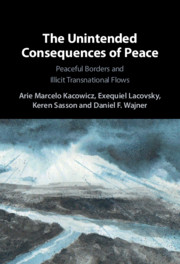Book contents
- The Unintended Consequences of Peace
- The Unintended Consequences of Peace
- Copyright page
- Dedication
- Contents
- Tables
- Preface
- Abbreviations
- 1 The Reality of Peaceful Borders and Illicit Transnational Flows
- 2 A Framework to Explain the Reality of Peaceful Borders and Illicit Transnational Flows
- 3 The Americas: A General View
- 4 The Americas: From the US-Canadian Border to the Tri-Border Area of South America
- 5 Europe: The Schengen Regime and the Western Balkan Borders
- 6 A Triangle of Peace in the Middle East: The Israeli–Egyptian and Israeli–Jordanian Borders
- 7 The Southern African Borders in the Postapartheid Era
- 8 ASEAN and the Southeast Asian Borders
- 9 Comparisons, Policy Recommendations, and Conclusions
- References
- Index
9 - Comparisons, Policy Recommendations, and Conclusions
Published online by Cambridge University Press: 11 June 2021
- The Unintended Consequences of Peace
- The Unintended Consequences of Peace
- Copyright page
- Dedication
- Contents
- Tables
- Preface
- Abbreviations
- 1 The Reality of Peaceful Borders and Illicit Transnational Flows
- 2 A Framework to Explain the Reality of Peaceful Borders and Illicit Transnational Flows
- 3 The Americas: A General View
- 4 The Americas: From the US-Canadian Border to the Tri-Border Area of South America
- 5 Europe: The Schengen Regime and the Western Balkan Borders
- 6 A Triangle of Peace in the Middle East: The Israeli–Egyptian and Israeli–Jordanian Borders
- 7 The Southern African Borders in the Postapartheid Era
- 8 ASEAN and the Southeast Asian Borders
- 9 Comparisons, Policy Recommendations, and Conclusions
- References
- Index
Summary
In this concluding chapter, we delineate theoretical insights drawn from relevant comparisons among the case studies and suggest policy recommendations. Specifically, we reassess the three hypotheses, identify and map relevant patterns from the different case studies across several regions of the world, offer several policy recommendations based on these patterns, and draw some general conclusions. In addition to the observable patterns as related to type of borders, political and institutional arrangements, and political economy, in the perusal of the eleven case studies we identified two additional elements that further explain the reality of peaceful borders and illicit transnational flows: the geopolitical location of regions and subregions, as hubs for transnational illicit flows; and the legacy of civil and intermestic wars. In the last part of the chapter, we suggest several policy recommendations: (1) be aware of the normative dilemmas of human security; (2) increase cooperation and develop effective mechanisms of governance at all the possible levels; and (3) promote and prefer peace rather than war, but be aware of its potential unintended consequences.
Keywords
- Type
- Chapter
- Information
- The Unintended Consequences of PeacePeaceful Borders and Illicit Transnational Flows, pp. 227 - 250Publisher: Cambridge University PressPrint publication year: 2021

